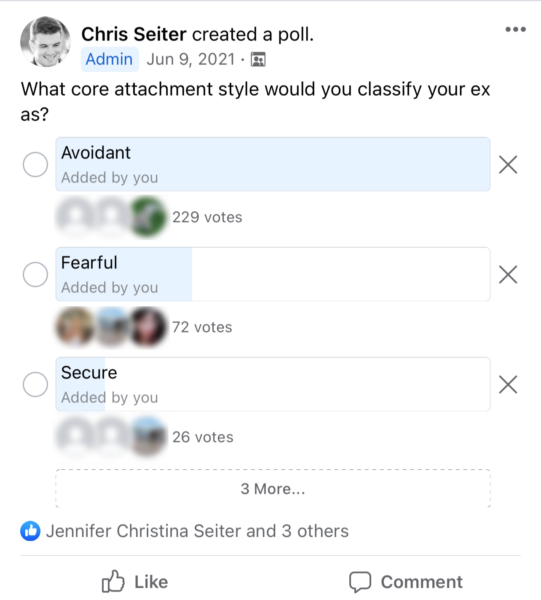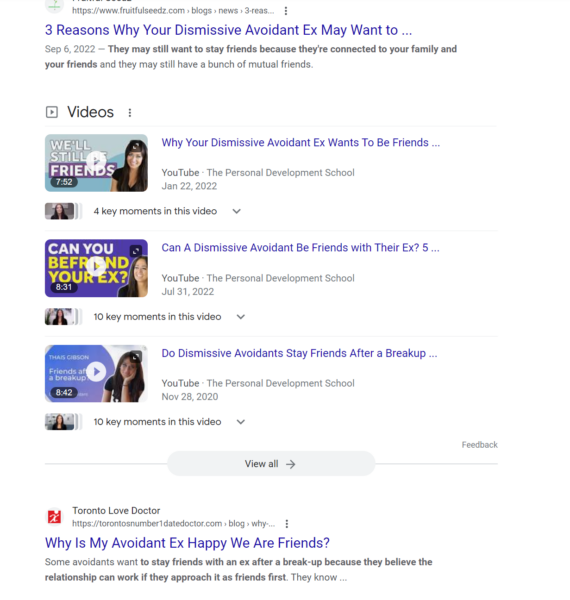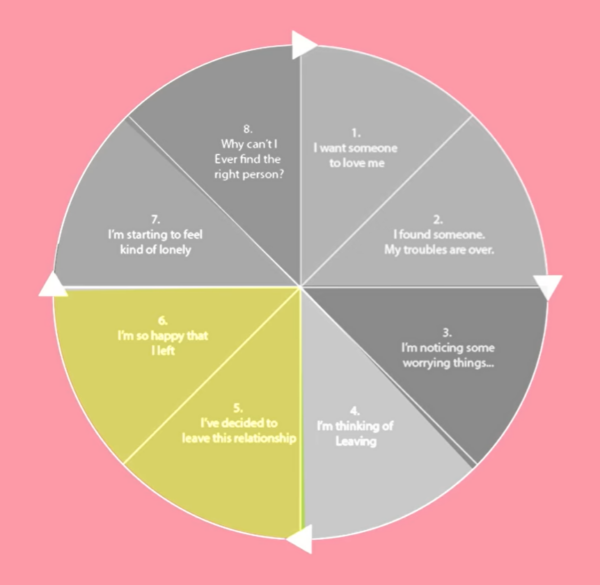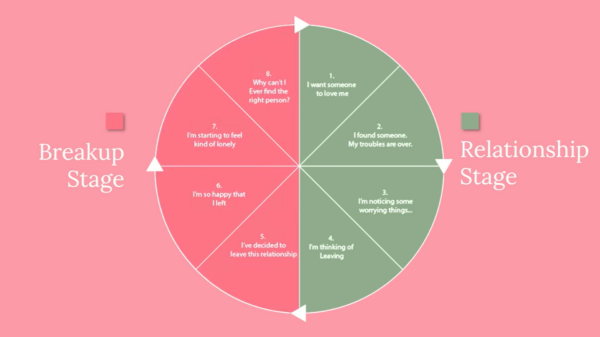I want to take an honest look at if being friends with an ex actually helps get them back.
And after researching for the better part of a day here’s what I settled on,
It can work, but it’s usually based on attachment style, situation and gender roles. It’s almost always better to try to “outgrow them” if you want them back and sometimes that means not being friends with them.
So, essentially what I’m arguing is that ya, it can work, but there are so many factors that actually contradict it that it’s rare. Ultimately it’s not the ideal strategy if you want to get an ex back.
But let’s peel back the layers.
I want to look at,
- What attachment styles teaches us about being friends with an ex
- How gender plays a role into this
- Looking at a situation where it’s actually recommended to stay friends with an ex to get them back
Let us begin!

What Are Your Chances of Getting Your Ex Boyfriend Back?
Take the quizWhat Attachment Styles Teach Us About Staying Friends With An Ex
So, in the past, I’ve made no apologies about the fact that most of our clients believe that their exes have an avoidant attachment style.
And so, I thought to myself when I was researching this topic, “Well, what do dismissive avoidants think about staying friends with an ex? How likely is it to happen?”
When you go online, you get a lot of different sources.
For example, I ended up stumbling across a couple of pretty great videos basically making the argument that it is possible for a dismissive avoidant to stay friends with an ex.
But, what those videos typically don’t say is how likely it is to happen.
So, it actually wasn’t until I stumbled across this quote from one of my favorite avoidant attachment resources, a website called freetoattach.com, that I actually found an answer to this question.
So, yeah, while it is possible that an avoidant can stay friends with an ex, it is actually very unlikely.
According to Free To Attach, it’s rare that an avoidant would want to be friends after a breakup. But, occasional contact with exes with whom they have a good dynamic – usually this would mean interaction that is light and non-emotionally open – can retain a comforting relationship bond for them, a feeling of genuine connection and support, and a much-needed boost for their ego without too much investment or the engulfment of over-dependence in the present.
So, essentially what this is arguing is that, more than likely, with an avoidant you aren’t going to be friends like you were before the breakup. At best, you’ll be acquaintances.
And this does make sense if you understand anything about how the avoidant values their independence. I personally don’t think dismissive avoidants want to be friends with their exes.
They’re likely happy being stuck in the separation elation phase.
But, I will say that typically, in situations where dismissive avoidants do seem like they want to be friends, it’s not true friendship.

What Are Your Chances of Getting Your Ex Boyfriend Back?
Take the quizIf you understand anything about that famous graphic that I’m constantly posting on the website and on YouTube – the Avoidant Death Wheel:
You’d understand that they go through this phase of separation elation, and then they kind of enter into this depression phase where they start feeling sorry for themselves and start lamenting about the fact that this is always happening to them and that they’re not going to find anyone else.
Usually, that’s when the whole cycle starts over again for an avoidant.
That is the moment where they decide, “Oh wait, my ex, I had a decent relationship with them, maybe I can go back to them.” And they start reaching out to you because they start thinking about the peak nostalgic moments that you two shared together. But, it’s important to remember that this feeling is often fleeting.
Over time, especially if you grow overexcited by the fact that they’re potentially contacting you, they end up retreating back into their shell.
In some cases, yes, they can get back into a relationship with you. But, then again, they’re not necessarily looking at you for companionship. They’re looking at you as someone who can supply them with physical benefits and emotional benefits.
To them, independence rules all. And, there’s nothing more independent than being alone and not staying friends with an ex.
But, there’s also another factor to consider here that people don’t often talk about, and that is the role gender differences play in this.
The Role Gender Differences Play
So, like I said at the very beginning of this article, I spent half a day researching this topic, asking all sorts of questions and trying to come up with something unique to say about it.
And this one was a difficult one because articles that have non-open-ended answers, a simple yes or no, are always more challenging to find unique “ins,” if you will.
So anyways, I was talking to my wife and I asked her,
“Hey, do you think there’s an advantage to staying friends with an ex that can ultimately help you get the ex back?”
She was very adamant about the fact that no, it’s not in your best interest.
I pushed back a little bit, saying, “Well, I do think there are situations where it can be helpful.” And I feel it’s important to look at both sides of the coin.
But, she brought up a really interesting point in her argument, which is that the roles men and women play, the gender roles, are often overlooked. And if you understand anything about how they work, it would definitely show you that it’s actually not in your best interest to stay friends.
So, why?
Men Trying To Get Their Ex Girlfriends Back
Well, let’s take a look at men who are trying to get their ex-girlfriends back.
My wife was adamant about the fact that women tend to place men in this perpetual friend zone.
Why?
Well, usually they’re getting their emotional needs met by the friend zone guy, while also going out and getting their physical needs met by this new romantic relationship partner.
So, you essentially stay in the friend zone as a guy who’s trying to get this girl back, and she knows she can rely on you for support, but she’s not interested in pursuing a relationship with you.
My wife was very adamant about the fact that women do this all the time. But if that woman ends up fighting with her new man, all of a sudden she’ll come back to the friend zone, and that guy becomes her new therapist.
I said to my wife when she was explaining this all to me,

What Are Your Chances of Getting Your Ex Boyfriend Back?
Take the quiz“Well, okay, I mean, that sounds interesting in theory, but is this just you theorizing? Do you have any research to back this up?”
To which she had the great answer of saying,
“I just know it in my gut.”
Okay.
But it wasn’t until I actually started considering the women trying to get their ex-boyfriends back that I realized there is research out there backing up this point.
Women Trying To Get Their Ex Boyfriends Back
So, I can speak from the male side of the coin.
So, my wife basically says that women who try to stay friends with their ex, usually, if they’re not interested in that ex, will place them in this perpetual friend zone. A
nd it’s not really a friendship at all. It is a one-sided relationship.
Men, on the other hand, usually don’t stay friends with their exes.
And what I know, I know from my own personal experience, and yes, there are always outliers to what I’m saying here, but I know from my personal experience that I have never stayed friends with an ex.
And there’s actually research backing this up.
So, there’s this really great Journal on Evolutionary Psychology that basically says:
That women tend to feel more comfort in relying on friends and family after a breakup.
So, right now, we already have something that’s backing up what my wife is saying. So, yes, women are more likely to place you as a friend, but it’s not true friendship. They’re usually sticking you in the friend zone.
The journal then goes on to argue:
Whereas men don’t want to give into the stigma of needing help after a breakup, which ultimately means they hold onto the breakup longer.
So, men are a lot more likely to be avoidant, to push their ex away.
They’re not going to seek help from anyone else, but they’re a lot more likely to hold onto the breakup. And as they’re holding onto the breakup, they’re not going to look at being friends with an ex as being friends with an ex.
They’re going to be looking at trying to potentially get an ex back later on.
So, there’s not true friendship there either.
The Curious Case Of “The Being There Method”
But what I would like to do now is actually flip the argument on its head and take an honest look at a situation where we do think that being friends with an ex is ideal and can help you.
I’m famous for my creation of a certain phrase.
There’s no doubt that one of the more difficult situations that you can find yourself in is going through a breakup and then finding out that the ex that you so badly want back has moved on to someone else.
In that particular case, the ideal way to approach them is something that we call the being there method.

What Are Your Chances of Getting Your Ex Boyfriend Back?
Take the quizNow, the being there method is a bit of a controversial strategy, but I can say definitively that it is something that actually does work.
And if you have something morally against it, I completely understand that. You obviously don’t have to use it. But the way I would frame the being there method is it’s essentially purposely friend-zoning yourself with your ex. So, you try to be friends with your ex. After the no contact rule and after all that prep work is done.
But essentially, when you’re doing that no contact rule with the intention of after the no contact rule being friends with an ex, the important part is that you are working towards having a more secure attachment style.
And essentially what you’re trying to do is after the no contact rule is up, after you’ve achieved this secure attachment style, you’re going to friend-zone yourself on purpose with your ex.
And what this will do is it will intimidate or aggravate the attachment style of the new person.
They’re going to see you as a threat and as a result, they’ll hopefully act very anxious and that will potentially cause friction between the new person and your ex. And your ex starts looking at you as the better option.
The beautiful part is you don’t have to do anything except be secure and be there.
Hence the being there method.
This is a situation where it’s ideal to be friends with your ex.
But it might be the only situation where it’s ideal to be friends with your ex.
And really that is only because the environment itself, the situation itself, requires you to have a secure attachment style so that the other person becomes insecure and ultimately self-implodes without you having to really do anything.
Because all you’re doing is just “being around.”



